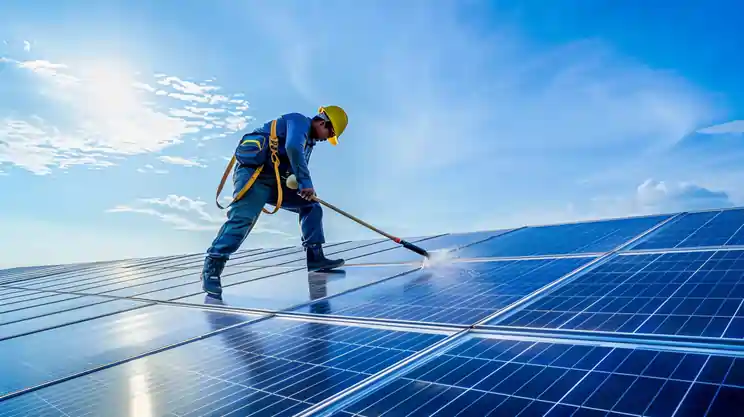Maintaining solar panels is crucial for ensuring they operate at peak efficiency and provide maximum energy output. Regular maintenance not only extends the lifespan of your solar panels but also protects your investment and contributes to sustainable energy production. Here’s a comprehensive guide to maintaining solar panels for optimal performance.
Common Maintenance Practices for Maintaining Solar Panels
1. Regular Cleaning
Regular cleaning is essential for maintaining solar panels. Dust, dirt, bird droppings, and other debris can accumulate on the surface of the panels, blocking sunlight from reaching the solar cells. This can significantly reduce the energy output of your system.
Cleaning Frequency and Importance
It is generally recommended to clean solar panels 2-4 times per year, depending on environmental conditions. Cleaning is important because even a thin layer of dust or debris can significantly reduce the amount of sunlight reaching the solar cells, decreasing energy output. Neglecting regular cleaning can lead to a gradual decline in system performance over time.
Best Cleaning Methods
The best methods for cleaning solar panels include:
- Using a soft brush or squeegee with lukewarm water: Gently remove debris without scratching the panels.
- Using a garden hose with a spray nozzle: Rinse off dirt and dust without using high-pressure washers that can damage the panels.
- Cleaning early in the morning or late evening: This prevents water from rapidly evaporating and leaving residue.
- Using mild, non-abrasive soap or solar panel cleaning solutions: For stubborn grime, avoid harsh chemicals.
2. Visual Inspections
Regular visual inspections are necessary for maintaining solar panels. Check for cracks, chips, loose connections, or any other signs of damage that could affect performance. This allows for early detection and repair of issues before they escalate.
3. Monitoring Energy Production
Monitoring energy production levels is essential for maintaining solar panels. Identifying any unexpected drops in output can help you detect problems such as shading, debris buildup, or equipment malfunction. Using monitoring software can help you track the performance of your solar panels and alert you to any issues that need addressing.
4. Tightening Connections
Over time, temperature changes can cause bolts, screws, and electrical connections to loosen. Regularly tightening these connections ensures that your system remains secure and functions efficiently. This step is crucial for preventing potential electrical issues and maintaining the overall safety of your solar panel system.
Professional Maintenance Services
While basic cleaning and inspections can be done by homeowners, professional solar panel maintenance services offer more thorough inspections, cleaning with specialized equipment, and necessary repairs. Annual professional maintenance is recommended to ensure optimal long-term performance and catch any developing issues early on. Professionals can also perform detailed diagnostics and ensure that your system is operating at its highest efficiency.
Benefits of Regular Maintenance
Regular maintenance following best practices is essential for maximizing the lifespan (25-30 years) and efficiency of solar panels over their operational lifetime. Proper maintenance protects the investment in a solar energy system and ensures it continues generating clean, renewable energy at peak capacity.
Importance of Professional Maintenance
Professional maintenance services play a critical role in maintaining solar panels. They provide comprehensive inspections and use specialized tools and cleaning solutions that homeowners might not have access to. Professionals can also identify and fix potential issues that might not be visible to the untrained eye, ensuring the system’s longevity and efficiency.
Tools and Products for Solar Panel Maintenance
Using the right tools and products is crucial for effective solar panel maintenance. Soft brushes, squeegees, mild cleaning solutions, and monitoring tools are recommended to keep your panels in top condition. Avoid using abrasive materials or harsh chemicals that can damage the panels. There are also specialized cleaning kits available designed specifically for solar panels that ensure thorough and safe cleaning.
Common Issues Affecting Solar Panel Performance
Several common issues can affect the performance of solar panels, including:
- Shading: Trees, buildings, or other obstructions can cast shadows on your panels, reducing their efficiency.
- Debris Buildup: Accumulation of dirt, leaves, or bird droppings can block sunlight.
- Weather Damage: Extreme weather conditions like hail or strong winds can cause physical damage to the panels.
- Loose Connections: Over time, connections can loosen, affecting the electrical flow and overall performance.
Case Studies of Effective Solar Panel Maintenance
Real-world examples highlight the importance of proper maintenance. In one case, a homeowner noticed a significant drop in energy production. Upon inspection, they found that a layer of dust and bird droppings had accumulated over several months. After cleaning the panels, the system’s performance returned to optimal levels. Another example involves a commercial solar installation where regular professional maintenance detected and repaired minor issues before they could escalate, ensuring continuous high performance and preventing costly repairs.
Conclusion
Maintaining solar panels through regular cleaning, visual inspections, energy monitoring, and professional maintenance services is crucial for ensuring their optimal performance. By following these best practices, you can maximize the efficiency and longevity of your solar panels, protecting your investment and contributing to a sustainable future. With proper care, your solar panels will continue to generate clean, renewable energy for decades, providing substantial savings and environmental benefits.
